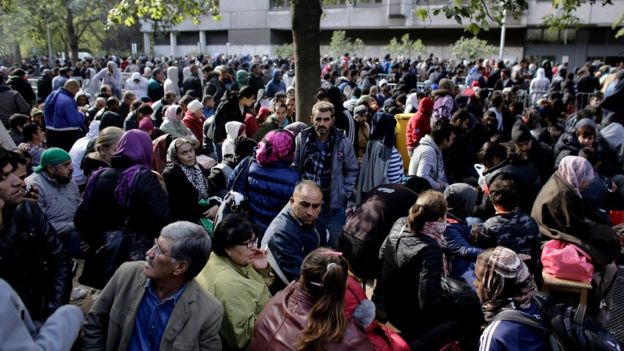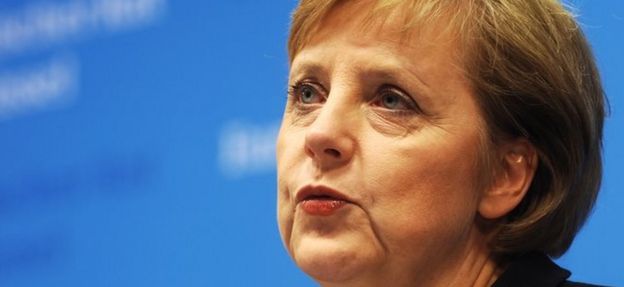
This article is more than
9 year oldSpeaking at a meeting of her Christian Democratic Union (CDU) in Berlin, she said she expected her toughest campaign to date, and vowed to "fight for our values and our way of life".
General elections are expected in Germany next year.
Mrs Merkel's poll ratings have slipped since the height of her popularity but she retains wide support.
The chancellor, who has been in office since 2005, is being challenged by the populist right-wing AfD party.
She announced she would stand again after meeting party leaders at CDU headquarters.
She told reporters that the decision to run for a fourth term had been "anything but trivial after 11 years in office".
She added that she expected challenges from both the right and the left of the political spectrum.
Is Merkel really on the ropes?
In September, Mrs Merkel accepted responsibility for election defeats for the CDU in several states and conceded that her open-door policy towards migrants was a factor.

Germany expected up to 300,000 migrants to arrive in the country this year, the head of the country's federal office for migration and refugees said earlier this year.
In 2015, Germany received more than a million applications for asylum.

She's kept Germany guessing for weeks, but it looks as though Angela Merkel has finally answered the so called K-frage (chancellor question).
A poll for one Sunday newspaper (in German) found that 55% of Germans would vote for her. Mrs Merkel's approval ratings have gone up and down in recent months as a result of her refugee policy but they remain the envy of other world leaders.
Even so, she will be battling the tide of populism that swept Donald Trump to victory in the States and which is also washing across Europe. The anti-Muslim party Alternative fuer Deutschland (AfD) is likely to win seats in the national parliament next year. It's highly unlikely to take Mrs Merkel down but it is leaching votes from Germany's established political parties.
Those parties are - by and large - likely to be relieved by Mrs Merkel's decision. In the past few years the job of German chancellor has become one of the most powerful political positions in the world. The next incumbent must not only lead the country but deal with a fragmenting EU, in a world which may be much changed by the new US administration.
It's widely (sometimes grudgingly ) accepted here that there simply isn't another realistic candidate for the job. As one broadcaster put it: "Angela Merkel - the indispensable".
Read more: Germany jolted by AfD success



A pastor's daughter who grew up in communist East Germany, Mrs Merkel has run the united country since 2005.
If she wins next year's elections, she would equal the post-war record set by Helmut Kohl, who was chancellor from 1982 to 1998.
Germany - Europe's economic powerhouse - does not have term limits on the country's top job.
